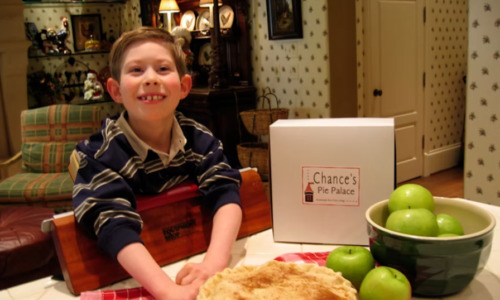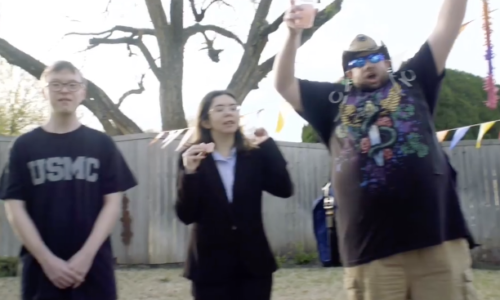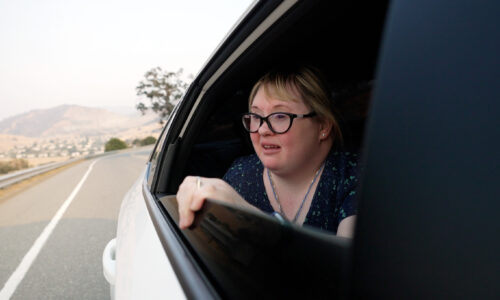When the school bus stops coming: The Alex Dean Story
April 26, 2022 by Alex Yocum-Beeman


Join us for an evening with Temple Grandin!
Thursday, May 5 | 7 pm | Tolleson Family Activity Center
Attend a presentation by acclaimed Autism advocate, Professor of Animal Science at Colorado State University, and New York Times bestselling author, Dr. Temple Grandin. Our hope is to better understand Autism Spectrum Disorder and how to best support individuals with this diagnosis to find true belonging in our North Texas community. The event will be followed by a 30-minute Q&A session and a book signing at 8:30 pm.
When you arrive at The Hub closest to the Sanctuary on Sunday mornings to get a muffin or cup of coffee, you will most likely find Alex Dean, Chance’s employee and Belong Disability Ministry participant, manning the cash register. And while he might give you a thank you and a smile during your transaction, he most likely won't be making eye contact or engaging in a bunch of small talk.
This is because Alex was diagnosed with PDD-NOS, otherwise known as atypical Autism, right before his third birthday.
For his parents, Laurie and Steve Dean, the only struggles they saw when he was born were that Alex was harder to comfort than their firstborn son, and had repeated ear issues, and bouts of pneumonia. Other than that, he seemed like a “normal” baby in their eyes. So when they took him to his pediatrician who saw some concern, they started looking for solutions to help these traditional medical conditions.
“After the ear tubes did not help (improve Alex’s speech/communication), he was enrolled in Early Childhood Intervention in Collin County,” Laurie said. “They did play therapy, worked on signing, and about a month or two in we didn’t see the progress any of us was hoping for. The ECI therapists recommended that we see a developmental pediatrician and that we might hear the word Autism. This was in the early 1990’s so this was pre-internet and everyone having a home computer, so other than the movie ‘Rain Man,’ we still didn’t really understand what that was.”
Soon after, Laurie and Steve were sitting with a doctor who spoke the word and told them that their son would most likely not progress beyond the age of eight, not talk to them, not hold a job, and never leave home. They were advised to get financial counseling to assist with caring for him for his lifetime.
“I thought we were going to go in, they were going to tell us he had Autism, and they would just write on a prescription pad—speech therapy three times a week, and anything else we needed like that,” Laurie said. “That’s not what we got.”
Instead, they were shocked and thrown into a world not many people knew about at the time.
“It’s been a learning curve for everyone,” Steve said. “When Alex first went to school he was enrolled in a preschool for students with special needs program (PPCD) through the public school system at the age of 3. It is so important to have early intervention. Alex and our family journeyed this new path together, learning and making adjustments as we went along.”
It was also important for the Dean family to take the time to connect with other families going through the same thing, as well as realize they needed to find ways for Alex to get the support he needed.
“Back in the 90’s there were kids getting diagnosed and moms and dads who didn't want to accept it. Even today many families feel the same way,” Laurie said. “I have always said, ‘It didn’t matter to me what that label was. If you need to call him a purple cow in order to get the correct services that meet his needs, then call him a purple cow. That doesn't change who Alex is or the fact we need to help him.’”
Once Alex transitioned into kindergarten in the local public school, he continued to receive special education services and other support like occupational, physical and speech therapy. Over the years as things began to click for Alex, and he was able to express himself through speech, his family started to better understand how he processed things.
“He is very direct and literal,” Laurie said. “If you say it’s 10 o’clock, and he looks at the clock and he will say ‘no it’s not, it’s 9:58.’ He’s not being rude, he’s just that precise and I remind him it’s ok and that things are ‘almost,’ but that’s not ok with him…it’s just so black and white. So we have learned that there is a lot of pre-teaching for him, and for those that interact with him.”
Now, at 28 years old, Alex holds two part-time jobs, “dabbles” as a writer, plays video games, and loves to participate in Belong's Spotlight: Short Film projects. He said all of these things have helped him connect with people who are similar to him and bring awareness to Autism.
“I like getting to meet other people with Autism,” Alex said. “It means there are more people like me out there with special needs. It shows others like me how they can live with Autism and shows other people what we are capable of and how to live with us.”
He also said that his “condition” has its upsides by making him focused and a better worker and that many people are just afraid of it because they don’t understand how it works.
“It’s not as bad as people make it out to be,” Alex said. “And you shouldn’t want to get rid of someone’s Autism because you don’t find it appealing. Autism is like a fact of life, it’s not going anywhere.”
This was also a sentiment his parents were told when he was younger, “It’s not going anywhere, so what happens after the school bus stops coming and he is in the real world?” So, for Laurie and Steve, programs like Belong were said to be a blessing. It makes him more confident, more animated, and builds a supportive community around him.
It has also helped Laurie find more of a community and now return the favor of helping other families going through different diagnoses.
“Don’t let the diagnosis scare you or give up on your child,” Laurie said. “You know, you thought you were going to land in one place but you end up in another. It’s still beautiful and it might not be where you thought it would be, but it’s still beautiful.”
And for Steve, it has helped him show others what his son and others on the Autism spectrum are capable of doing.
“Autism spectrum kids are not dumb, they can be hyper-intelligent, they just can’t communicate as well as other people,” Steve said. “If you read some of Alex’s writing, you would be shocked by what you are getting, then when you meet him in person you would think that was someone different. The perception of Autism can be that they are slower, or not as intelligent, and that’s just flat-out wrong. They need extra processing time to understand what has been said or asked and then to formulate a response.”
So now, as you go grab a cup of coffee at the Sanctuary Hub or Chance’s Coffee Shop in the Tolleson Family Activity Center or Wesley Hall basement, take a moment to strike up a conversation with Alex about the latest YouTube video you watched or your favorite Super Smash Bros. character. He also loves jokes and would love to hear one from you.
And as Alex’s mom, Laurie said, “find those commonalities between you and them. You would be shocked what friendships can come from that.”




